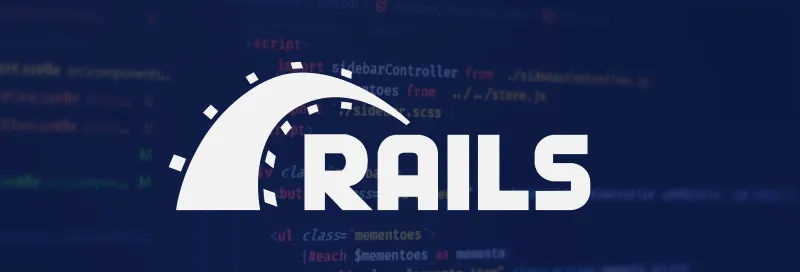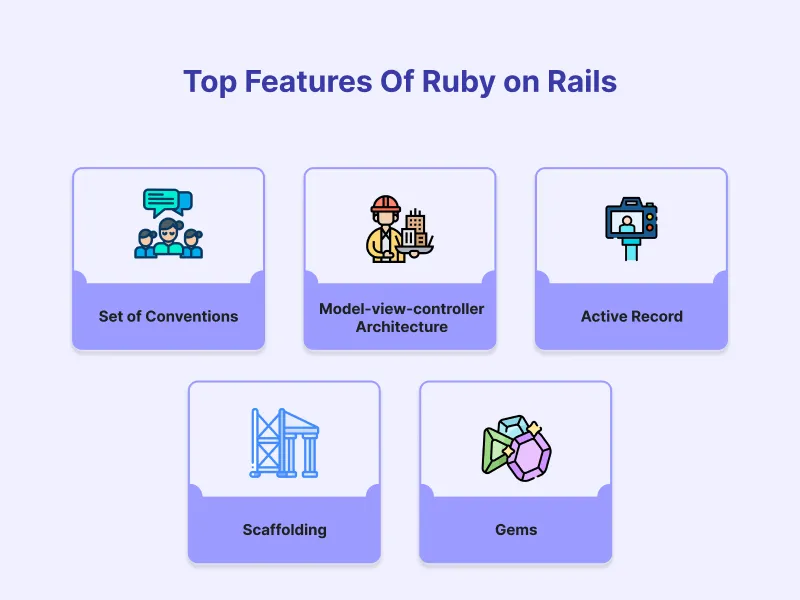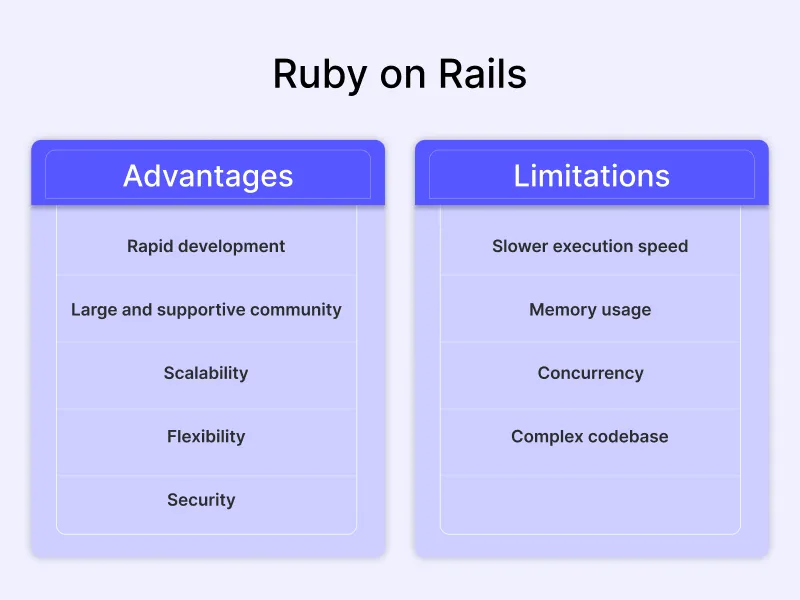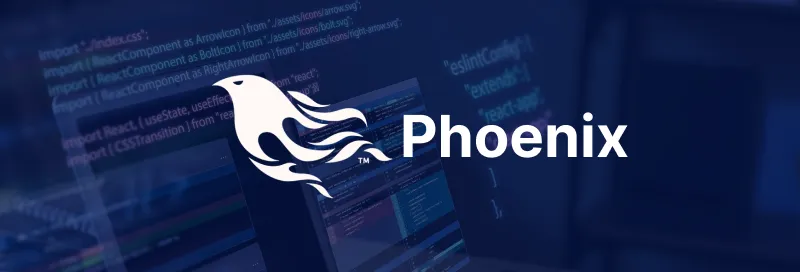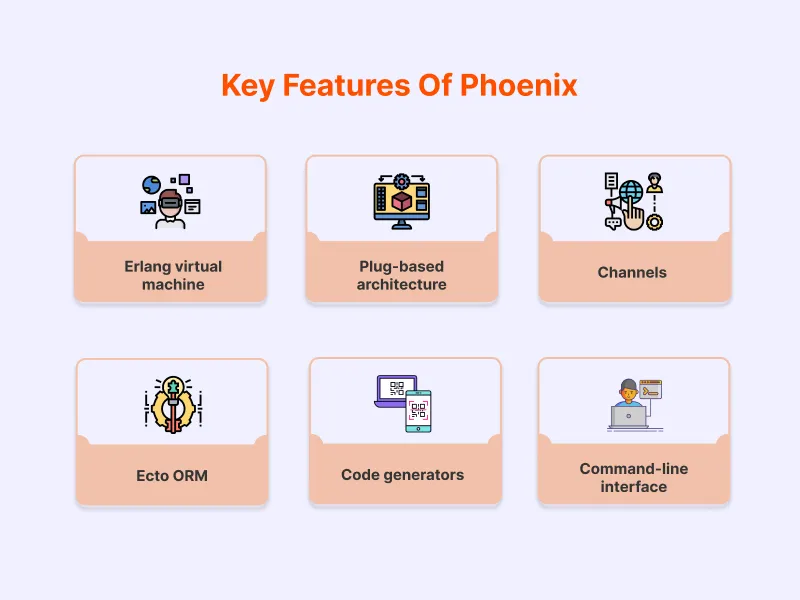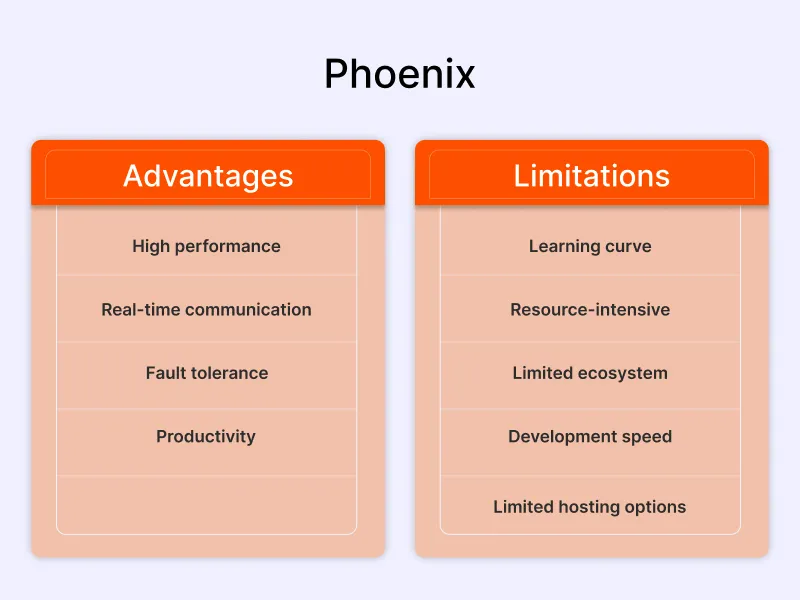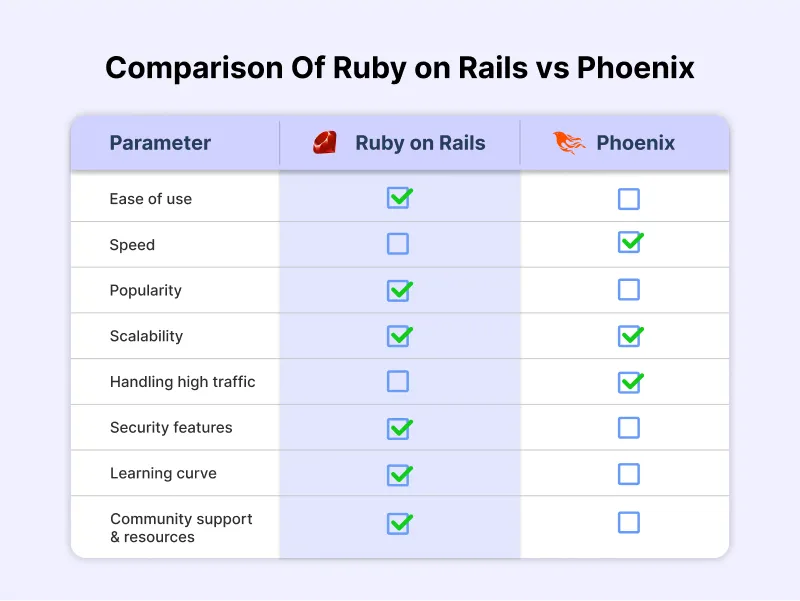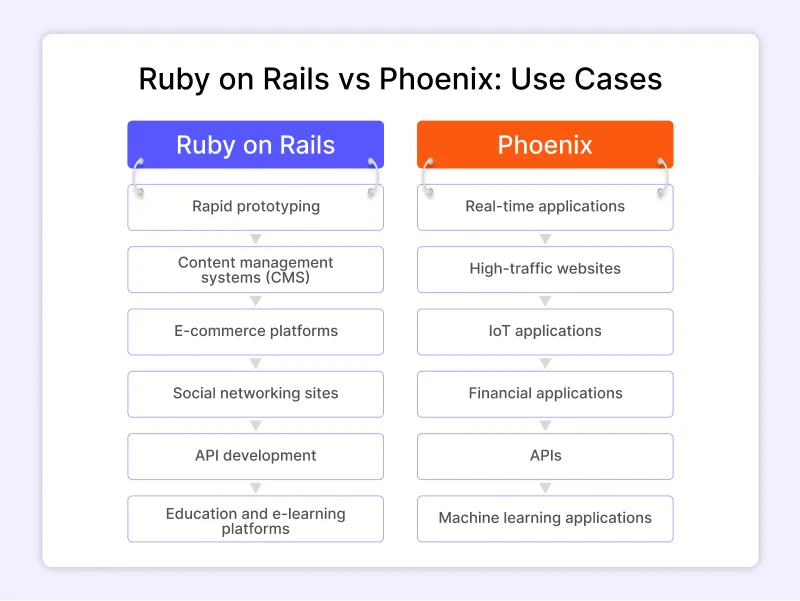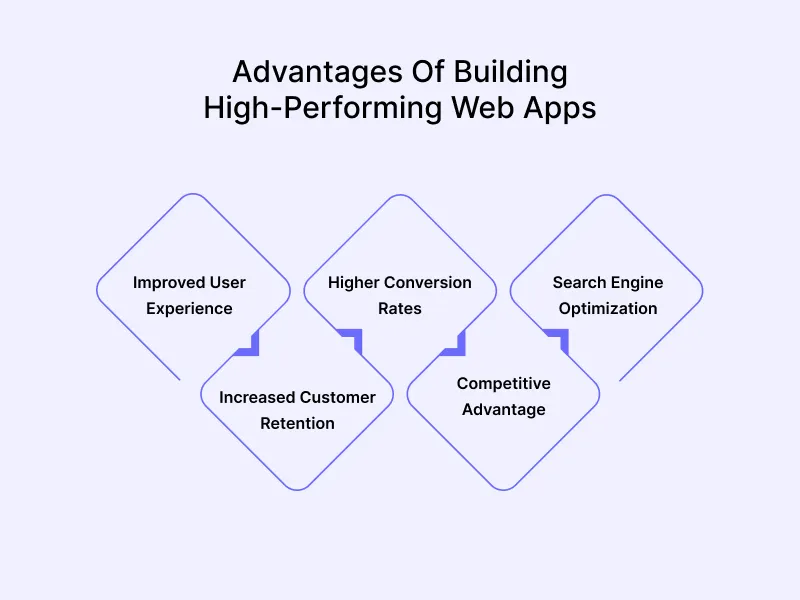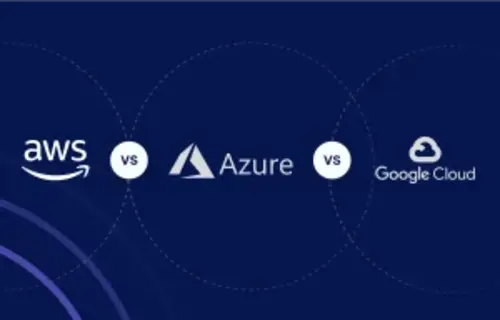Choosing between Ruby on Rails and Phoenix frameworks for web app development can be challenging for many businesses. Both are highly popular and offer various advantages.
In this comparison, we’ll understand the Phoenix vs Rails factors like execution rate, flexibility, community support, and more to help you make an informed decision.
Whether you prioritize performance, scalability, or ease of development, understanding the strengths and weaknesses of each framework is crucial.
By examining these aspects closely, you can determine which framework aligns best with your project requirements and long-term goals.
Continue reading as we explore the aspects of Ruby on Rails and Phoenix to discover which one delivers high-performance solutions tailored to your web app needs.
An Overview Of Ruby on Rails Framework
Ruby on Rails (RoR) is a web application framework written in Ruby, popularly known for its simplicity and productivity.
It follows the Model-View-Controller (MVC) pattern, streamlining development with conventions and built-in features like scaffolding and ORM support.
Rails boasts an extensive ecosystem of libraries and plugins (gems) that enhance functionality and accelerate development. Its active community ensures ample support and resources for developers.
Overall, hire RoR developers to enable the rapid development of robust web applications with clean code organization, making it a popular choice for startups and established businesses alike.
Trust ValueCoders to optimize your Ruby on Rails project for maximum efficiency.
Top Features Of Ruby on Rails
Now, let’s look at the key features that make Ruby on Rails a powerful and popular choice for building web applications.
Let’s look at the key features that make Ruby on Rails a powerful & popular choice for building web applications.
1. Set of Conventions
Hire Ruby on Rails developers to utilize the conventions of Ruby on Rails to reduce the time required for setup and attain higher efficiency in application development.
2. Model-view-controller Architecture
Ruby on Rails uses the MVC architecture pattern by splitting the application’s data, control logic, and user interface into separate components. This streamlines app development, testing, and maintenance processes.
3. Active Record
Ruby on Rails provides a streamlined experience by utilizing Active Record (an advanced object-relational mapping tool) for developers looking to handle data and interactions between objects through object-oriented programming.
4. Scaffolding
Ruby on Rails provides web developers with a resource to quickly create code for operations like building, reading, updating, and removing data using scaffolding methodology. This is highly efficient and a time saver when building web applications.
5. Gems
Ruby on Rails utilizes a package manager i.e., RubyGems. It enables developers to incorporate and handle external libraries and tools easily. Hence, it helps in expanding the functionalities of web applications.
These features collectively make Ruby on Rails a robust and efficient framework for web development.
By leveraging these powerful tools and conventions, developers can build high-quality, scalable web applications quickly and with fewer complexities.
This is why Ruby on Rails remains a preferred option for many businesses and developers worldwide.
Also Read – Top 10 Web Development Companies Catering to Global Clients
Advantages of Ruby On Rails For Building Web Apps
Ruby on Rails is one of the best web frameworks for creating high-performance web applications. Let’s look at some of the advantages of Ruby on Rails:
1. Rapid Development
Ruby on Rails simplifies and speeds up the development process with its convention-over-configuration feature using custom web development services.
It enables developers to focus more on building applications than setting them up. Its incorporated utilities, such as database management & testing, drastically reduce the development time.
2. Large and Supportive Community
The developer community of RoR is highly active and connected. It offers open-source libraries, friendly discussion in forums and chat rooms, and various educational blog posts/tutorials. Finding support and resources is easier and helps streamline the development process.
3. Scalability
Ruby on Rails provides scalability by utilizing the MVC architecture pattern and other paradigms that handle high traffic and data. Moreover, it simplifies the maintenance and modification of applications over time.
4. Flexibility
Ruby on Rails provides its developers with a robust platform for constructing all kinds of web-based applications, from simple sites to complex systems.
Additionally, its pre-configured components for completing regular development chores, such as authentication & authorization, are a real boon to developers who desire to maximize their efficiency in utilizing software application maintenance services.
5. Security
Some incorporated security mechanisms prevent frequent web vulnerabilities like SQL injection and XSS. The application of parameterized queries and other security protocols facilitates the writing of more secure code.
Utilizing the advantages of Ruby on Rails, ValueCoders has developed two amazing web applications for our clients:
- Covid Test Collection Site: It is a test collection site where users can schedule their tests easily without any hassle.
- Local Community App: It is an online hub where businesses, a local group of people with specific interests, and clubs come together to build a strong community.
Let ValueCoders fine-tune your Ruby on Rails framework for high performance.
Some Limitations Of Ruby on Rails
Ruby on Rails is a strong framework for building flexible web apps. However, its limitation is the potential to create highly efficient web programs. Some of the limitations include:
1. Slower Execution Speed
Due to its interpreted nature, Ruby on Rails cannot achieve the same level of performance as other compiled languages such as C or Java. This makes creating high-performance web applications more difficult.
2. Memory Usage
With limited memory on a server, running Ruby on Rails can cause performance issues as the language can be intensive on memory. This is a significant concern for web applications that attend to high requests.
3. Concurrency
Ruby on Rails does not provide any integrated mechanisms for concurrent programming. Hence, it complicates the task of developing applications that require handling numerous requests simultaneously.
4. Complex Codebase
As Ruby on Rails applications grow in size, the complexities of their codebase make maintenance and updating more challenging.
To address the above limitations and utilize the advantages of Ruby on Rails, you may outsource software application maintenance services from ValueCoders. We have been serving global clients since 2004.
Overview of Phoenix Framework
Chris McCord, the inventor of the Elixir language, introduced Phoenix in 2015. It is an open-source framework for web applications designed with the Elixir programming language.
Phoenix provides web developers with the means to create fast, reliable, and fault-tolerant web applications that emphasize real-time interaction and maximum efficiency.
This platform has built-in utilities, such as testing facilities, code generators, and a CLI, to facilitate a beginner’s entry into web development.
Also Read: IT Consulting Services That Are Changing the Game in 2025
Key Features Of Phoenix
Phoenix is a modern web framework designed for high performance and scalability, built using the Elixir programming language.
It leverages several innovative features to streamline the development process and enhance the capabilities of web applications.
1. Elixir Programming Language
Phoenix utilizes Elixir programming language. The language is renowned for its efficacy and reduced latency.
2. Erlang Virtual Machine
Powered by the Erlang virtual machine, Phoenix operates within a highly concurrent and reliable framework for web applications.
3. Plug-based Architecture
Phoenix offers a plugin system that gives web developers the ability to incorporate and remove functionalities uncomplicatedly.
4. Channels
Phoenix offers integrated tools for Websockets and channels. It facilitates instantaneous interaction between customers and servers.
5. Presence
Phoenix offers an in-built presence monitoring feature. Hence, it enables instantaneous tracking of the availability of users.
6. Ecto ORM
The Ecto Object-Relational Mapper (ORM) included with Phoenix gives users a comprehensive yet straightforward way of interacting with databases.
7. Code Generators
Phoenix offers various code generators to speed up the development process. These generators are tailored to the typical needs of developers.
8. Testing Tools
Phoenix provides developers with integrated testing utilities. It helps them in both crafting and running tests for their apps.
9. Command-line Interface
The Phoenix platform has a powerful command-line interface. It simplifies frequent operations and automates complicated processes.
These key features make Phoenix an excellent choice for building reliable, real-time web applications with minimal latency.
By taking advantage of these robust tools and capabilities, developers can create scalable and efficient applications, making Phoenix a strong contender in web development.
Partner with ValueCoders to ensure top-notch performance with Ruby on Rails or Phoenix.
Advantages of Phoenix For Building Web Apps
Phoenix is an exemplary web development framework with remarkable capabilities for creating efficient, reliable, and expandable web applications. The advantages of Phoenix framework include the following:
1. High Performance
Phoenix utilizes the performance and low latency of the Elixir programming language, allowing it to take on substantial traffic while preserving its efficiency and dependability.
2. Real-Time Communication
Phoenix has incorporated WebSockets to facilitate immediate communication between servers and customers, rendering it well-suited for developing real-time programs like chat systems or multi-player games.
3. Fault Tolerance
Phoenix is engineered to endure any kind of fault and still maintain operational status, which makes it an optimal choice for developing applications that must handle massive traffic and uphold extreme availability.
4. Productivity
Phoenix has several built-in assets and capabilities that facilitate the initiation of web development. These include code creators, pre-installed assessment mechanisms, and a CLI that allows developers to remain productive during the development journey.
Limitations Of Phoenix
When creating a high-performance web application, developers should remember that although there are various advantages of Phoenix for web development, it also has some limitations.
1. Learning Curve
With its Elixir programming language, Phoenix offers a challenge to those new to functional programming, as it may take a while to adjust to its specific syntax.
2. Resource-intensive
Phoenix poses an intricate challenge for the deployment and scaling of applications due to its extensive demand for memory and processing power.
3. Limited Ecosystem
Despite Phoenix boasting an ever-expanding library of utilities and resources, it remains an immature framework compared to Ruby on Rails and Node.js. This can make it more difficult to acquire community support or external libraries for particular tasks.
4. Development Speed
Although Phoenix offers outstanding efficiency, the fact that it concentrates on dependability and resilience implies that crafting intricate applications with Phoenix may take more time than with other frameworks.
5. Limited Hosting Options
Developers may struggle with deploying and managing Phoenix, as the framework is not as well-known, resulting in fewer hosting options tailored to it.
When creating a high-performance web application, developers should remember that Phoenix, although a potent web development framework, has some constraints.
Also Read: The Only Guide You Need to Pick the Best Web Development Language
If you plan to build an app on Phoenix or Ruby on Rails framework, hire dedicated software development teams from ValueCoders.
We have highly experienced developers who can cater to the complex requirements of businesses and provide them with highly efficient solutions.
Comparison Of Ruby on Rails And Phoenix For Building High-performance Web Apps
When we compare Phoenix vs Rails, both are popular and best web frameworks with their strengths and weaknesses regarding performance, ease of use, scalability, handling high traffic, security features, community support, and resources.
1. Speed
Built with Elixir, Phoenix offers lightning-fast speeds and great concurrency capabilities, whereas Ruby on Rails may not be able to keep up when dealing with vast datasets.
Clear Winner: Phoenix
2. Ease of Use
With its uncomplicated syntax and adherence to established standards, Ruby on Rails has earned accolades for being one of the most straightforward web frameworks to understand and use. Even though Phoenix may not be as friendly for newcomers as Rails, it is still relatively user-friendly for those with a prior understanding of other web frameworks.
Clear Winner: RoR
3. Popularity
Various popular businesses, including Airbnb, GitHub, and Shopify, use Ruby on Rails, a long-standing framework with an extensive network of developers. On the other hand, with a recent arrival in the programming realm, Phoenix is gradually amassing an extensive user base of renowned entities. Bleacher Report, Moz, and PepsiCo.
Clear Winner: RoR
4. Scalability
Ruby on Rails and Phoenix both have the capacity for scalability. RoR uses an MVC architecture pattern, while Phoenix stands out due to the design of its programming language, Elixir. Specifically, Elixir was made to create stable, distributed systems.
Clear Winner: Tie
5. Handling High Traffic
Phoenix has an advantage over Ruby on Rails due to its efficient concurrency model regarding web applications with heavy usage. Phoenix is designed to process multiple requests simultaneously, making it the perfect tool for handling high traffic.
Clear Winner: Phoenix
6. Security Features
When comparing security features, Ruby on Rails provides various tools and plugins for additional safety. Despite this, Phoenix has the advantage of its underlying language, Elixir, offering built-in security features that make it inherently secure.
Clear Winner: RoR
7. Learning Curve
Ruby on Rails is easier to learn as compared to Phoenix. The web developers found RoR much easier than Phoenix as it requires a good knowledge of Elixir programming and Erlang virtual machine.
Clear Winner: RoR
8. Community Support & Resources
Compared to Phoenix, the Ruby on Rails community is well-established and overflowing with helpful resources for developers. Nonetheless, the Phoenix community is rapidly growing, and many materials are accessible for developers wanting to study or use the framework.
Clear Winner: RoR
In the end, both Ruby on Rails and Phoenix have their distinct advantages and are suited for different types of projects. Your selection should depend on your specific needs, project requirements, and long-term goals.
By understanding and comparing Phoenix vs Rails, as well as the pros and cons of each framework, you can make a well-informed decision that best supports your web development objectives.
Give a Read: Top 10 Mobile App Development Companies That Innovate Unique Solutions
Ruby on Rails VS Phoenix: Use Cases
Ruby on Rails is ideal for startups and businesses that want to develop web applications quickly and efficiently.
Its ease of use and vast library of gems make it perfect for projects with tight deadlines and limited resources. Companies like Airbnb, GitHub, and Shopify use Rails for its simplicity and rapid development capabilities.
Phoenix, on the other hand, is well-suited for applications that require high performance and scalability.
Built with Elixir, Phoenix excels in handling real-time features and large numbers of concurrent users.
It’s a great choice for applications needing robust concurrency and low-latency communication, such as chat applications, messaging systems, and real-time data processing.
Companies like Bleacher Report and Moz leverage Phoenix for its speed and reliability.
In short, when we compare Phoenix vs Rails, Ruby on Rails is best for rapid development and ease of use, while Phoenix is optimal for high-performance and scalable applications.
Trust ValueCoders to enhance your RoR or Phoenix project's performance and competitiveness.
Advantages of Building High-performing Web Apps
In the modern digital age, it is imperative to build fast and efficient web applications to meet users’ needs and maintain a competitive edge.
Selecting an appropriate framework for web applications is necessary to give users a smooth experience and match the ever-growing user requirements.
Let’s have a look at some of the most significant advantages of developing high-performance web apps:
Improved User Experience
Web applications with fast loading time and quick response enhances the user experience, making it effortless and enjoyable. As a result, users can stay engaged and more satisfied with their real-time experience.
Increased Customer Retention
With superior speed and performance, the framework for web applications can boost customer retention and build customer loyalty. Users will keep returning to the app if the user experience is streamlined and effective. It ultimately results in decreased attrition and enhanced loyalty.
Higher Conversion Rates
Swift-loading web apps can improve the success of your business. This is due to the rapid response times, which increases user engagement and, thus, conversion rates. Consequently, a fast website brings more sales, registrations, and other key outcomes.
Competitive Advantage
High-performance web applications can give your business an edge in today’s web landscape as it delivers exceptional performance. It also allows its users to have heightened expectations for speed and quality.
Search Engine Optimization
Search engines like Google pay attention to website speed, especially when determining rankings. Websites that perform well and respond swiftly to requests are more likely to appear at the top of the search results. This will bring increased visibility and more visits.
By prioritizing high performance in web app development, businesses can enhance their online presence and attain better user satisfaction.
Ultimately, investing in a high-performance framework is essential for success and growth in the long-run digital marketplace.
Also Read: Top 21 PHP Web App Development Companies
Parting Thoughts!
When it comes to building fast-paced web applications, there is no single perfect choice. However, when we compare Phoenix vs Rails, your decision should be based on the project’s unique needs and demands.
As we conclude the comparison, it can be seen that Ruby on Rails offers versatility and is an excellent option for constructing quick prototypes, content managing systems, social media networks, educational resources, and e-commerce solutions.
On the other side, the advantage of Phoenix is it stands out as an excellent choice for developing real-time projects, apps that utilize IoT, applications related to financials, machine learning operations, and high-traffic websites.
Hence, businesses must carefully consider their project’s unique needs and end goals before selecting a framework for web applications.
Ruby on Rails will be ideal if the requirement calls for constructing different kinds of web apps. Phoenix could be the better alternative for real-time apps or sites with plenty of traffic.
Additionally, when it comes to finding the right development experts, you can hire web application developers in India from ValueCoders.
We specialize in web development services, catering to the needs of a wide range of industries across the globe.
We have been providing quality and reliable back-end development services and front-end development services since 2004.

